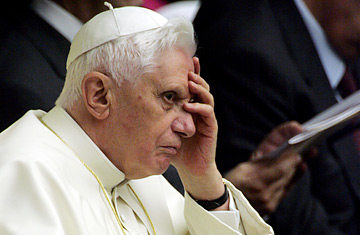
Pope Benedict XVI attends an oratory concert "Resurrexi" offered by the Italian Bishops Conference at the Paul VI Hall at the Vatican, Wednesday, May 23, 2007.
For the most part, his major writings and speeches, which by all accounts are the work of his pen alone, are consistently clear and often quite potent. But more and more, it seems, there will be some sentence or citation — or a blatant omission — that inadavertently ignites controversy, if not outright rage against the Pope. The Vatican eventually kicks into damage-control mode, and finally, Benedict is left with the awkward task of serious papal (and public) backtracking. Indeed, there was a "here-we-go-again" buzz circulating among Vatican insiders as the Pope went out of his way this week to clarify his view of the Christian colonization of Latin America that he'd laid out on his recent trip to Brazil.
Benedict's supporters say that the world simply isn't adept at digesting a man of such conviction and confidence who, even they would admit, doesn't have the deft diplomatic touch of his predecessor. Particularly in these high-profile speeches, his main objective is to push the intellectual envelope, and prove a point with whatever historical and philosophical means are at his disposal. The Pope's critics, by contrast, warn that Benedict is missing advisers who can help edit his speeches and tell him what he might not want to hear, so he isn't forced to eat his words after the fact. In the 25 months of the papacy, the following five diplomatic incidents and subsequent papal corrections stand out.
July 7, 2005: Response to London Bombings
THE STATEMENT: According to a leaked draft of Benedict's condemnation of the suicide bombings in the London transit system, the Pope was going to characterize the attacks as "anti-Christian."
THE REACTION: Such a phrase immediately seemed ill-advised, both in light of the varied faiths of the victims and the potential for adding fuel to anti-Muslim sentiment
THE CORRECTION: Though it wasn't clear if the phrase from the draft speech was actually the Pope's or that of then Secretary of State Cardinal Angelo Sodano, it was excised from the official version released by the Vatican. It was an early sign that there might be problems in the way the new pontiff and his aides respond to diplomatic crises.
May 28, 2006: Discourse at Auschwitz-Birkenau Concentration Camp
THE STATEMENT: In an otherwise poignant theological meditation on the Holocaust, the Pope made no mention of anti-Semitism, or the fact that the Nazis killed millions of Jews because they were Jewish. Benedict also failed to acknowledge that there might be some degree of collective responsibility of the German people, blaming the Holocaust solely on a "ring of criminals."
THE REACTION : Jewish leaders and historians criticized the speech, and commentators wondered why the German Pope did not mention his own experience during the War.
THE CORRECTION: Two days after he'd returned to Rome, the Pope addressed the issue again, using a general audience to cite the "six million Jews" killed, and to explicitly condemn anti-Semitism.
Sep. 12, 2006: Lecture on Faith and Reason at the University of Regensburg
THE STATEMENT: Benedict cited a Byzantine emperor's insults about the Muslim prophet Mohammed, without explicitly saying that he didn't agree with the remarks. He also said Islam's absolutist conception of God precluded reason, and was perhaps a source for religious-inspired violence. He never mentioned Christianity's faith-based violence of the past.
THE REACTION: The speech prompted widespread anger in the Muslim world, with mass demonstrations and violence erupting among some extremists that included the burning of churches and the killing of a nun.
THE CORRECTION: The Pope repeatedly expressed remorse for how his comments had been perceived, and stated both out loud and in the revised text of the speech that he did not agree with the emperor's characterization of the Muslim prophet. He also added a visit to Istanbul's Blue Mosque to his subsequent trip to Turkey.
May 9, 2007, Press Conference on Papal Flight to Brazil
THE STATEMENT: The Pope said he agreed with Mexican bishops' apparent excommunication of pro-choice Catholic politicians.
THE REACTION: Even before he landed in Brazil, a flurry of news stories circulated about how the Pope's pronouncement could mean that thousands of Catholic politicians who support abortion rights were at risk of excommunication. Several Mexican pols said they would ignore the Pope's declaration, though U.S. Presidential candidate Rudy Giuliani quipped that it's best not to argue with the Pope.
THE CORRECTION: While still on the plane, Vatican spokesman Rev. Federico Lombardi repeatedly tried to clarify the Pope's remarks. In the official transcript of the press conference released the next day, the Pope's response to the excommunication question was "cleaned up," and made to look as though he had merely been stating a general principle of Catholic canon law rather than responding to the current situation in Mexico.
May 13, 2007, Speech to Latin American bishops in Aparecida, Brazil
THE STATEMENT: Speaking about the Church's role in colonizing Latin America, the Pope said: "The proclamation of Jesus and of his Gospel did not at any point involve an alienation of the pre-Columbian cultures, nor was it the imposition of a foreign culture." He made no mention of the long history of forced conversions and other forms of violence perpetrated by Catholics.
THE REACTION: Various South American indigenous groups — as well as leftist Venezuelan President Hugo Chavez — demanded a papal apology.
THE CORRECTION: At his Wednesday general audience, the Pope went out of his way to declare: "It is not possible to forget the sufferings and injustices inflicted by the colonizers on the indigenous population, whose fundamental human rights were often trampled upon." As in the past, one wonders why, if "it is not possible to forget," the Pope apparently forgot to put the remarks in the original speech in the first place.
